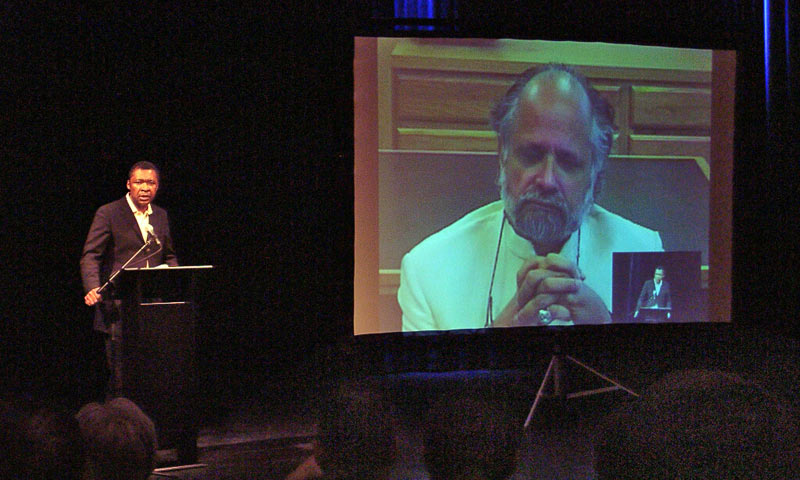For an optimal view of our website, please rotate your tablet horizontally.
8 June - 15 September 2002
Kassel, Germany
Artistic Director: Okwui Enwezor
Co-curators: Carlos Basualdo, Ute Meta Bauer, Susanne Ghez, Sarat Maharaj, Mark Nash, Octavio Zaya
With the 11th edition, the documenta (which takes place every five years) was led for the first time by a non-European curator, and an international curatorial team. This 2002 edition is regarded as the first documenta with a truly global, postcolonial perspective.
From March 2001 to March 2002, transdisciplinary platforms took place on four continents, fundamentally expanding the traditional format of documenta. They were conceived as discursive public interventions around present-day issues of art, politics, and society. The fifth and final platform was the exhibition in Kassel. It presented works by 117 artists, many of whom reflected on issues of global significance discussed before.
Our selection of artworks published in 2002 especially highlighted this expanded perspective of documenta 11, as the focus on the 'Global South' was an essential part of our concept since the launch of Universes in Universe in early 1997. In the year 2019, we republished our documenta 11 Special, to make it available for mobile devices and with larger images.

Okwui Enwezor and Homi Bhaba, Platform 1, Berlin, 2001
© Photo: Haupt & Binder, universes.art
Vienna, Austria, 15 March - 20 April 2001
Berlin, Germany, 9-30 October 2001
"Even if democracy has been the watchword for different kinds of participatory governance and political systems of the last half century, to a large degree it remains a project under constant reinvention. The notion unrealized alluded to in the title of this project is a way to interpret the varied modifications that the ethic of democracy and its institutional forms have undergone and continue to undergo today, making democracy a fundamentally unrealizable project, or put another way as a work in progress." In his introductory words, Okwui Enwezor also describes the issues requiring particular consideration:
- Exploring the Term Unrealized
- The End of History, Emergent Democracies, Unstable Democracies
- Tolerance
- Work Ethic
- Development Ethics, Globalization and Democracy
Transitional Justice and the Processes of Truth and Reconciliation
New Delhi, India, 7-21 May 2001
Conference bringing together about 30 participants, incl. historians, legal scholars, film makers, visual artists, psychoanalysts, curators, anthropologists, art historians and theater makers. A video and film program featured 35 films by 26 directors.
The platform's intention was "to examine not only the central arguments that form the core of the juridical and social methods of Truth Commissions as they pertain to state crime and violence; it also argued for a sober reflection on other complex conflicts (ethnic, racial, religious, and sectarian) that are seen as extra-territorial and marginal to the discourse of the search for truth and reconciliation."
Saint Lucia (Caribbean), 13-15 January 2002
This platform took the form of a closed workshop bringing together linguists, literary and cultural theorists, philosophers, writers and artists to whom the notion of Creoleness is a challenging notion.
The discussions revolved around three main themes: Creolité and Creolization; Modernity, Urban Culture and Creoleness; Language and Creoleness.
Four African Cities: Freetown, Johannesburg, Kinshasa, and Lagos
Lagos, Nigeria, 16-20 March 2002
The introductory text highlights, among the aims of this platform, "to examine the vital place of these cities in the political, social, and cultural economy of the region and focus on the nature of their social destabilization whether from war, crime, urban decay, AIDS, and population explosion. But more than serving as testament for further deracination of the African continent, the conference will also be concerned with the analyses of how to reinvent the urban imaginaries of these cities as places that still hold great potential for human vitality, creativity, and inventiveness."
8 June - 15 September 2002
Venues: Museum Fridericianum, documenta-Halle, Kulturbahnhof / Balikino, Binding-Brauerei, Orangerie, Karlsaue, Kasseler Innenstadt / Nordstadt (city center and north)
Artists and groups: 117
The exhibition in Kassel was the fifth and last platform in the concept introduced by Okwui Enwezor and his curatorial team, composed of Carlos Basualdo, Ute Meta Bauer, Susanne Ghez, Sarat Maharaj, Mark Nash, and Octavio Zaya.
Many of the artworks presented took up the themes of the previous platforms and other issues of global significance in different ways. While the documenta Halle was devoted primarily to artists’ collectives and archive-based projects, the works of art shown in the Fridericianum and the Binding brewery were staged on a generous scale, with nearly every work occupying a room of its own. The works installed in the Auepark and public space referred to complex issues far beyond the context of their sculptural appeal.
Platform6
On April 29, 2021, documenta archiv launched Platform6, a virtual platform created in honor of Okwui Enwezor. This dynamic and evolving online project is intended as a place for animated discussion about Documenta11 and the current relevance of its discourses.
More about and access ►
documenta & Museum Fridericianum Veranstaltungs-GmbH
Friedrichsplatz 18
D-34117 Kassel, Germany
Phone: +49 561 70727-0
FAX: +49 561 70727-39
Location on map